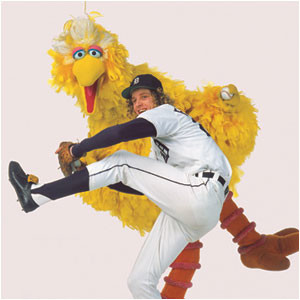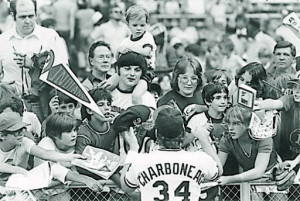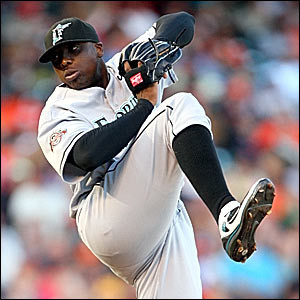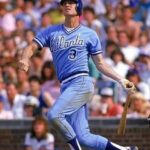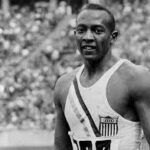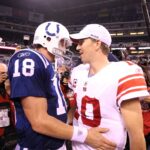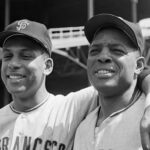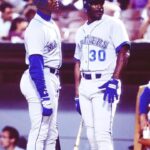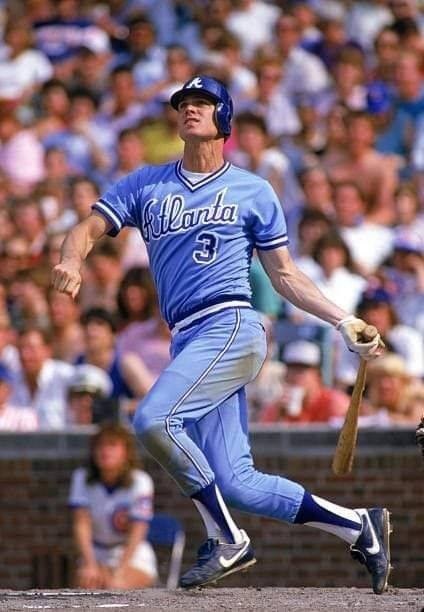Flash and Burn – Rookie of the Year Doesn’t Guarantee Long-term Greatness
The recent Major League Baseball Draft has brought a new crop of prospects vying to one day secure major league stardom. It is likely that a significant number of players selected in the draft will reach the majors, but even if they achieve short-term success, forging a long and successful career is much harder.
Many players who burst onto the scene as rookies have struggled to maintain that success over the long-term. Below is a look at some former Rookie of the Year winners whose careers soon flamed out.
Earl Williams – 1971 NL Rookie of the Year: At 6-foot-3 and 215 pounds, Earl Williams was a powerfully built versatile player who was primarily a third baseman when he came up with the Atlanta Braves late in the 1970 season. After hitting .368 in 10 games in 1970, Williams earned a starting position for 1971. He began the season at third base, but despite having never played catcher in the minors was soon planted behind the plate and caught 71 games out of the 145 he played as a rookie, On a team with all-time slugger Hank Aaron, Williams proved to be another valuable weapon as he finished second on the squad with 33 home runs and 87 RBI while hitting .260. Playing primarily behind the plate the next season, Williams again had strong offensive numbers with 28 home runs and 87 RBI. However, after striking out only 80 times as a rookie, he whiffed 118 times in 1972. The Braves traded him to Baltimore in the offseason for second baseman Davey Johnson and several other players. He gave Baltimore much needed offensive pop in 1973 with 22 home runs and 83 RBI. His power numbers started to decline in 1974 as he hit only 14 home runs with 52 RBI. He was traded back to Atlanta after the season and spent a year and a half with the Braves before finishing the 1976 season in Montreal. After being released by the Expos, he hit 13 home runs with 38 RBI for the Oakland A’s in 1977. That proved to be the end of the line for Williams, who finished his career with 138 home runs, 457 RBI and a career batting average of .247. He passed away from Leukemia in 2013.
Mark “The Bird” Fidrych – 1976 AL Rookie of the Year: Few players have enjoyed the meteoric rise or quick fall of Mark “The Bird” Fidrych. Earning a spot on the Detroit Tigers roster as a rookie in 1976, Fidrych made only two relief appearances during the first month of the season. However, in his first major league start on May 15th, he allowed the Indians only two hits and one run in a 2-1 complete game victory and the legend of “The Bird” had begun. With his curly hair and lanky body, Fidrych quickly was dubbed “The Bird” in reference to Sesame Street character Big Bird. He also entertained the crowd with his many mannerisms, including grooming the mound and talking to the baseball. Though he lost a 2-0 decision to Boston in his next start, Fidrych rebounded to win his next eight starts, with seven complete games, including back-to-back 11 inning performances. He took his act national on June 28th when more than 32 million people watched on ABC’s Monday Night Baseball as he defeated the New York Yankees 5-1. After losing a 1-0 decision to Kansas City on July 9th, Fidrych entered the All-Star game with a 9-2 record and 1.78 ERA and was named the American League starter for the All-Star Game. For the season, Fidrych completed 24 of 29 starts (five of which went extra innings) and had a 19-9 record and 2.34 ERA in 250 innings. He won the Rookie of the Year Award and finished second in the Cy Young voting. Fidrych suffered a knee injury while fooling around in the outfield in spring training before the 1977 season. However, he appeared fine after his return as he posted a 6-4 record with a 2.89 ERA, but suffered a shoulder injury (later diagnosed as a torn rotator cuff) that proved to be the beginning of the end of his career. He would make only 19 starts for the Tigers over the next three seasons with a 4-6 record. The Massachusetts native tried to make a comeback with the Boston Red Sox, but eventually retired after pitching for the Pawtucket Red Sox. Fidrych died on April 13, 2009 after an accident on his farm.
Joe Charboneau – 1980 AL Rookie of the Year: Though he never achieved the national notoriety of Fidrych, Joe Charboneau was a local phenomenon when he burst onto the scene as a rookie for the Cleveland Indians in 1980. Originally expected to spend the 1980 season at AAA for the Indians, Charboneau got his chance for major league stardom following an injury to veteran slugger Andre Thornton. He responded by hitting .289 with 23 home runs and 87 RBI for the Indians. Unfortunately, Charboneau suffered a back injury in spring training the following year and played only 48 games for the Indians in the strike-shortened 1981 season. He was sent to the minors soon after the strike ended in August to become the first Rookie of the Year to return to the minors the following year. His struggles continued in 1982 as he played in only 22 games at the major league level. Charboneau hit only six home runs with 27 RBI in 70 major league games following his rookie campaign. He holds the distinction of playing the fewest games at the major league level (201) for a Rookie of the Year winner.
Ron Kittle – 1983 AL Rookie of the Year: Timing can be everything for a baseball prospect and in 1983 Ron Kittle was in the right place at the right time. Teaming with long-time slugger Greg Luzinski, Kittle provided much-needed power for the Chicago White Sox. He blasted 35 home runs and drove home 100 runs with a .254 batting average to help the White Sox reach the playoffs for the first time since 1959. However, Kittle struck out a league leading 150 times and that proved to be a precursor to future struggles for the slugger. He hit 32 home runs in 1984, but hit only .215 with 137 strikeouts. His numbers continued to decline in 1985 as Kittle hit 26 home runs with 58 RBI and a .230 average. He was traded to the New York Yankees during the 1986 season and hit only 16 home runs in a year and a half in New York. Over the next four years he bounced around with two more stops with the White Sox as well as stints with the Orioles and Indians. Kittle retired following the 1991 season with 176 career home runs, 460 RBI and a .239 batting average.
Jerome Walton – 1989 NL Rookie of the Year: It is not often that the top competition for Rookie of the Year honors is between teammates, but that proved to be the case in 1989. A pair of outfielders, Jerome Walton and Dwight Smith, were key reasons the Chicago Cubs won the National League East and eventually fell to the San Francisco Giants in the NL Championship Series. Walton ultimately won the Rookie of the Year Award as his critical role as the leadoff hitter helped set the table for the Cubs all season. Walton hit .293 while scoring 64 runs, stealing 24 bases and driving home 45 runs. He had an OBP of .335 and an OPS of .721. He hit .364 in the NL Championship Series. Walton was a regular for most of the next two seasons, but wasn’t able to replicate his rookie success. After becoming a free agent following the 1992 season, Walton played for five different teams over the next six seasons. He completed his career with a .269 batting average, 241 runs scored, 25 home runs, 132 RBI and 58 stolen bases.
Bob Hamelin – 1994 AL Rookie of the Year: While some players had great timing for their careers, others were perhaps not so fortunate. Bob Hamelin was a big (6-foot-1, 240 pounds) first baseman in the traditional mold of old-time sluggers like Boog Powell, Frank Howard and George Scott. However, he happened to come up at a time when the proliferation of performance enhancing drugs made everyone a slugger and thus his size and inability to play a position other than first base was somewhat of a liability. Hamelin burst on the scene for the Kansas City Royals with 24 home runs, 65 RBI and a .282 batting average before baseball stopped in August of 1994. Ironically, he edged Manny Ramirez for Rookie of the Year honors. Hamelin would never again rekindle the power of his rookie season. He hit 16 home runs with 65 RBI over the next two seasons for the Royals. He was released before the 1997 season and actually had a solid season after being signed by the Detroit Tigers. He hit .270 with 18 home runs and 52 RBI in 110 games. However, he struggled the following year with the Milwaukee Brewers and was out of the game after six major league seasons.
Dontrelle Willis – 2003 NL Rookie of the Year: On a team full of young stars, none on the 2003 Florida Marlins shined any brighter than Dontrelle Willis. A flamboyant 21-year-old left-handed pitcher, Willis joined the Marlins in May and was soon a key part of a team that would go on to win the World Series. After splitting his first two starts, Willis reeled off seven straight victories and made the All-Star team. He finished the season with a 14-6 record and 3.30 ERA. Also a credible hitter for a pitcher, Willis hit .241 with a home run and four RBI. Willis struggled slightly the next year with a 10-11 record and 4.02 ERA. However, in 2005 he was among the most dominant hurlers in baseball. He registered a 22-10 record with a 2.63 ERA while leading the league with seven complete games and five shutouts. Over the next two years Willis started 69 games while posting a 22-27 record. His 2007 record of 10-15 with a 5.17 ERA signaled the end of his run with the Marlins. Willis and slugger Miguel Cabrera were traded to the Detroit Tigers during the 2007 offseason. While Cabrera has gone on to be a star for the Tigers, Willis never was able to rekindle his past success. He posted only a 4-15 record while pitching for the Tigers, Diamondbacks and Reds over the next four seasons. He was signed by six different franchises over the next four years, but was never again able to make it to the majors. His final career totals included a 72-69 career record with 4.17 ERA.
